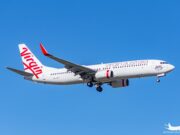Qatar Airways passengers are again able to carry their personal electronic devices in the passenger cabin on flights bound to the United States from Doha, the airline said Thursday.
“Qatar Airways and Hamad International Airport have met with all requirements of the U.S. Department of Homeland Security’s new security guidelines,” the airline said in a statement posted on its website.
Earlier this week, three airlines based in the Middle East said they had met strict new U.S. requirements for passenger screening and the U.S. government has told them that their passengers are again permitted to carry personal electronic devices (PEDs) onto U.S.-bound flights.
Etihad Airways, Emirates and Turkish Airlines say their procedures have satisfied the requirements set forth last week by U.S. Homeland Security Secretary John Kelly for stepped-up security measures intended to discourage terrorist action against airliners.
Kelly’s order followed a March ban on electronic devices larger than cell phones from the passenger cabins of commercial flights bound for the United States from 10 airports in the Middle East and North Africa. There were suggestions that the ban on PEDs be expanded to other airports, but instead, Kelly called for a package of new security measures for all commercial flights to the United States and said that the ban would be lifted for airlines that complied.
“Dear passengers,” Turkish Airlines said in an announcement posted Wednesday on its Facebook page, “welcome on board to our U.S.-bound flight. Please fasten your seatbelts and enjoy your own electronic devices.”
Also on Wednesday, Emirates said that “effective immediately,” laptops and PEDs were being permitted in the cabins of its flights from Dubai to the United States.
Etihad, the first airline to comply, made a similar announcement Sunday.
The U.S. requirements ordered last week called for enhanced screening of passengers and their PEDs, increased security around aircraft and in passenger areas, use of more advanced technology and establishment of additional preclearance locations.
Editor’s Note: This article was updated on July 6. It was originally published July 5.


